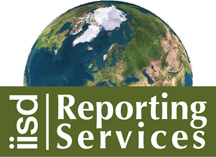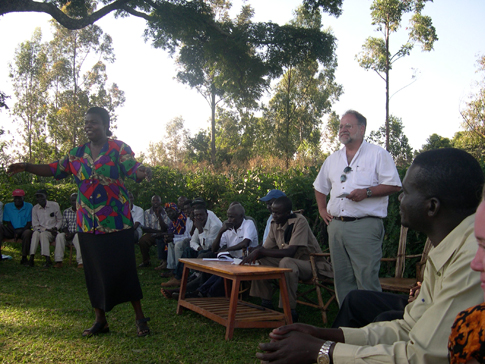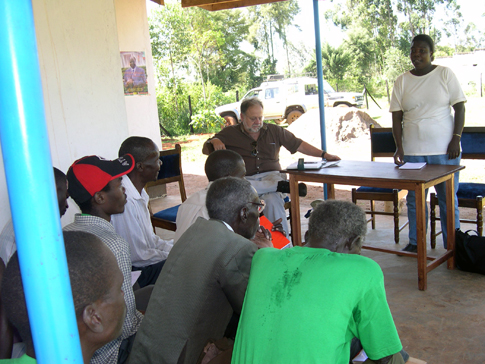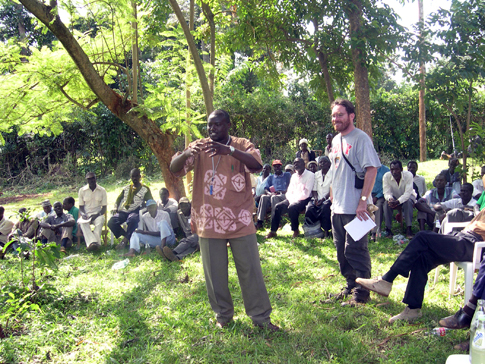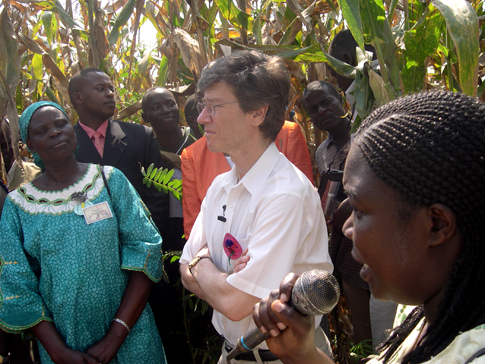News * Abou us * the ENB team * DONATE * Activities * Search * IISD RS home * IISD.org * RSS * What is RSS? * Links |
|
MEA Bulletin Guest Article
Monday,
16 July 2007 CREATING TRADING ZONES AND EXPERTISE FOR CLIMATE INFORMATION By Marie Rarieya, Department of Science & Technology Studies, Rensselaer Polytechnic Institute, Troy, New York, USA (rariem@rpi.edu) Abstract Increasing recognition that the world’s poorest people and countries are most at risk from climate change because of dependence on agriculture for livelihood, and also because of a generalized incapacity to cope and adapt to climate extremes, has driven investment in seasonal forecasting. Farmers, breeders, foresters and developers will have to adjust their adaptive strategies, in some cases to integrate traditional and scientific knowledge on practical adaptation actions and measures to respond to climate change. It is important to enhance climate knowledge – weather predictions that governments, decision makers and farmers need – to improve adaptation within a location-specific context. Many kinds of expertise are required in sustainable agriculture, and there is a constant need to develop trading zones in which expert knowledge can be shared between people who often are very different from each other. Introduction Increasing recognition that the world’s poorest people and countries are most at risk from climate change because of dependence on agriculture for livelihood, and also because of a generalized incapacity to cope and adapt to climate extremes (El Niño/La Niña events), has driven investment in seasonal forecasting. The Third and Fourth Assessment Reports (2001; 2007) of the Intergovernmental Panel on Climate Change (IPCC), for example, highlight the vulnerability of the poor to climate change impacts, noting the potential of greatly reduced crop yields in most tropical and sub-tropical regions due to temperature changes, decreased availability of water, new or increased pests and flooding, and the potential for increased incidence and severity of waterborne-related diseases (cholera, malaria, schistosomiasis). The Fourth IPCC report (2007) states that by 2020, between 75 and 250 million people in Africa are projected to be exposed to an increase of water stress due to climate change. It is evident that farmers, breeders, foresters and developers, to mention a few, will have to adjust their adaptive strategies, in some cases to integrate traditional and scientific knowledge on practical adaptation actions and measures to respond to climate change. The argument for integrating climate information into mainstream development initiatives links to the overarching argument of this article – both farmers and conservation scientists have expertise critical to the success of sustainable development, but better linkages between different kinds of knowledge need to be developed. The climate factor defines the context in which stakeholders (in food security and environmental protection and other sectors) design and implement their work. Many critical agricultural activities (research and development) must take into account climate information in their planning and decision making processes in order to cope effectively and improve on adaptive capacity to climate-related hazards. This article uses Western Kenya as an example of a phenomenon occurring elsewhere in sub-Saharan Africa, in which environmental problems that undermine local food security are closely linked to climate change effects. This article addresses the following question: What organizations and resources can help scientists and policy makers respond to climate change? Expertise, Food Security, and Seasonal Climate Information Well-designed information systems will be critical to achieving food security and sustainable development. Seasonal climate forecasts have the potential to help farmers and other stakeholders adapt to climate variation and change. Effective use of climate forecasting to enhance the food security of vulnerable populations will be extremely difficult to realize without acknowledgment of the multiplicity and complex interplay of variables, trends and types of systems that impact food production and availability. Recognizing this interplay makes the challenge of food security seem almost overwhelmingly complex, yet paradoxically such recognition can help identify possible points of intervention. New information about climate variation and change makes the already overwhelming challenge of food security even more complex – because the information will be continually updated and probabilistic, and because it will implicate the functioning of entwined biophysical, technological, political-economic, social and cultural systems. This calls for the crafting of what historian Peter Galison has called a “trading zone.” A concept designed to explain how scientists from different fields work together despite dramatically different interests, outlooks and practices (Galison 1997). According to Galison, groups can agree on rules governing how they should work together even as they maintain very different ways of thinking about the phenomena and tools they are working with, and perhaps even about the purpose of collaboration. Despite “vast global differences,” trading partners can “hammer out a local coordination” in a way similar to the way groups that speak different natural languages establish contact languages to enable interaction. Such shared languages “can vary from the most function-specific jargons, through semi-specific pidgins, to full-fledged creoles rich enough to support activities as complex as poetry and metalingusitic reflection” (Galison 1997:783). An extraordinary amount of collaboration and organizational coordination will be needed to translate information about climate variability and change into successful practical initiatives. Different forms of expertise will be required, and a robust “trading zone” where different kinds of experts can “hammer out coordination” will be crucial. Many kinds of expertise are required in sustainable agriculture, and there is a constant need to share expert knowledge between people who often are very different from each other. Scientists need local knowledge, yet often speak a different language than local people, have different habits of communication and social interaction, and different ways of assessing the accuracy and usability of knowledge. Local people involved in conservation can often benefit from scientific understanding of soil, water and climate but often mistrust extension workers responsible for sharing such knowledge, or lack the resources necessary for moving from knowledge to investment. Nuanced understanding of the dynamics of expertise is thus critical to the implementation of sustainable agriculture. Climate change challenges push one to ask: Who should play a critical role in setting and enforcing rules that support development challenges? To promote sustainable development, approaches to policy innovations must be integrated, collaborative, and multi-sectoral. An integrated and multi-sectoral approach is necessary to streamline policy so that legal and regulatory frameworks governing natural resource use can be enforced such that degraded and deforested areas are rehabilitated and environmental pollution is addressed. These initiatives will require that development practitioners understand the characteristic, social organization and structure and group dynamics of the local community. These challenges demand action from actors at all levels, ranging from individuals to social organizations, NGOs, private sector, central government and to the international community. Effective responses to climate change challenges require unprecedented cooperation across disciplines and beyond national boundaries, and mitigation strategies (actions) at different levels of social organization of operation: local, national, regional and global. Action at the local levels, such as response to disaster (drought and floods) mainly requires continued assistance to people in terms of rescue, resettlement of displaced people, ensuring supply of water, food and medicine, among others. An effective response framework requires building synergies and collaboration with local, regional and global partners across disciplines and relevant institutions. Furthermore, knowledge sharing strategies are part of this complex relation. The challenge for sustainable development is not one-way technology transfer or even two-way information flow, but coordinated trade between different forms of knowledge: scientific, technical, sociological, economic, cultural, etc. Thinking in terms of food security and environmental degradation calls for the integration of local knowledge on soil conservation practices and expert knowledge. Both the scientific and the local communities can collaborate in fostering technological innovations that can improve agricultural production, while enhancing environmental sustainability. However, movement from knowledge to practice is not straightforward. Implementation of knowledge depends on political, economic, infrastructure and social institutions. Initiatives in western Kenya illustrate the importance and challenge of expertise in sustainable agriculture. Diverse initiatives, led by different types of organizations, have been undertaken, involving different ways of creating and sharing knowledge. It is thus possible to gain comparative insight, and understanding of how different configurations of expertise work. New forms of expertise are being developed to help farmers in Kenya and elsewhere respond to weather variability and climate change. The biannual Climate Outlook Forum for the Greater Horn of Africa is particularly promising. This forum provides regional, near term (six month horizon) climate prediction that can help farmers decide when to plant, what varieties of seeds to plant, and how to strategize during the overall growing season. Informed decision making of this sort of course depends on effective circulation of information, amongst climate scientists, sector specific users of climate information and associated institutions at national, regional and international levels. Key climate-sensitive sectors include Agriculture and Food Security, Livestock; Water Resources; Health; Hydropower; Settlements; Marine and Coastal Zone Management; Tourism; Disaster Management; Building and Construction; Transport and Communications; Economic Planning; and Conflict Early Warning. The institutional and human capacity to implement climate forecast information is currently limited in sub-Saharan Africa, including Kenya. Effectively addressing both the challenges and the opportunities presented by changing climatic conditions will require improved levels of understanding and additional knowledge and skills among a broad range of groups: local communities, policy makers, national institutions and non-government organizations including the private sector. Investment in research and collaborative activities that build capacity and strengthen local institutions will have long-term effects on climate mitigation measures. There is also a need to build the capacity of national institutions to effectively enforce laws, regulations and policies dealing with the sustainable use of resources, to alleviate the negative impacts. Building the capacity of the local community will be vital for sustained agricultural growth and environmental sustainability. This will require an understanding of social organization and structure at the community level and also assessment of whether the present structures facilitate or rather frustrate progress towards achieving sustainable development. Building the capacity of the local community allows them to engage with experts as equal partners on a more level ground. Efforts to build the local capacity must also strive to build a sense of community ownership at the local level. Areas of capacity building on the adverse effects of climate change include: early warning, risks, information sharing, decision making by scientists, farmers, policymakers, and credit facilities management. Further, there is a need to improve scientific understanding of climate change concerns as a basis of climate policy formulation at the national, regional and global levels. Presently, linkages between researchers and policymakers including politicians are weak. We need to get a better understanding of: how climate information is shared, whose knowledge is used in designing coping and mitigation measures, and how the linkage between scientists and policymakers and between scientists and local communities can be strengthened. Specifically, there is a need to develop tools to strengthen local capacity to mitigate land degradation concerns arising from extreme climate events. In addition, there is a need to conduct research into alternative livelihood opportunities that will help reduce pressure on the already vulnerable members of the society. References Galison, P. 1997. Image & logic: A material culture of microphysics. Chicago: The University of Chicago Press. IPCC. 2001. Third Assessment Report for Policymakers: The Intergovernmental Panel on Climate Change.
-----. 2007. Climate
Change 2007: Impacts,
Adaptation and
Vulnerability. |

